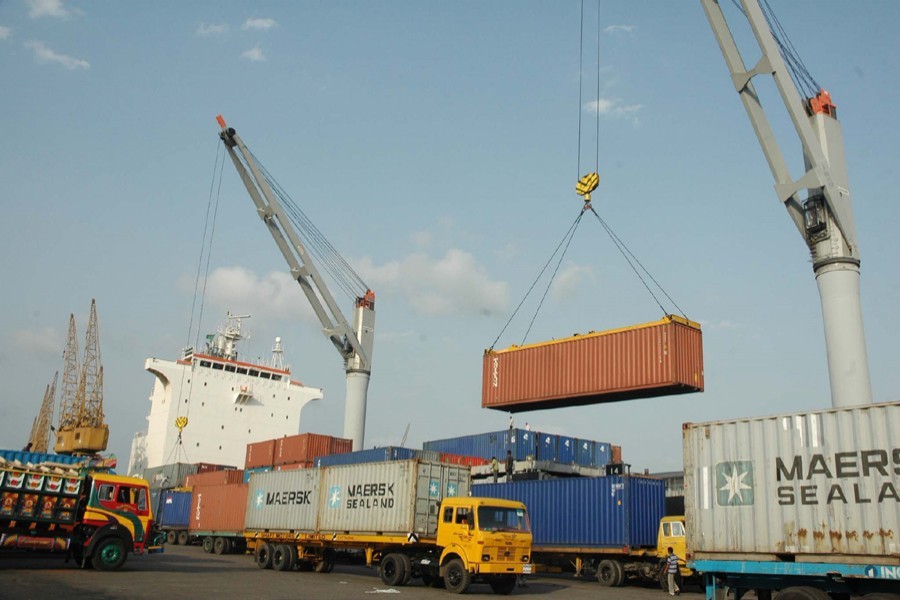Country’s trade deficit widened nearly three times in the first four months of the current fiscal year (FY), prompting some economists to prescribe thrift on luxury buys.
Officials attribute the yawning trade gap mainly to higher import-payment pressure on the economy during the steady rebound from the pandemic recession worldwide.
The trade deficit with the rest of the world increased by 160.27 per cent or US$5.60 billion to $9.10 billion during the July-October period of FY 2021-22, from $3.50 billion in the same period of FY'21, according to central bank's latest statistics.
During the period under review, import expenses jumped by 51.42 per cent while export earnings recorded a 20.45-per cent growth.
The overall import costs stood at $23.90 billion in the period against $15.78 billion in the same period a year earlier.
On the other hand, export earnings stood at $14.80 billion in the first four months of this fiscal year from $12.29 billion in the same period of FY'21.
Bangladesh's foreign trade, covering import and export, increased significantly during the period under review thanks to a gradual pickup in economic activities, both domestic and global, amid reopening after more than one year due to the Covid-19 pandemic.
Besides, higher prices of essential commodities on the global market had also pushed up the country's import payments in the first four months of FY'22, the officials explained.
"Higher imports indicate domestic economic activities are growing," a senior official of the Bangladesh Bank (BB) told the FE while relying to a query.
He also said the upward trend in foreign trade may continue in the coming months following the reopening of business activities across the country.
"Our export earnings as well as export market should be expedited immediately to reduce trade deficit," Mustafa K Mujeri, executive director of the Institute for Inclusive Finance and Development (InM), told the FE.
The senior economist also said the pressure on the country's overall balance of payments (BoP) may mount if the existing trend in trade deficit continues.
"Import of luxury items should be discouraged, if necessary," Mr Mujeri, also a former chief economist of the BB, said, adding that the overall import monitoring should be strengthened to curb unnecessary ones.
Meanwhile, the country's current-account deficit deteriorated further during the period under review following higher import-payment obligations along with lower inflow of remittances.
The current-account deficit rose to $4.77 billion during the July-October period of FY'22 from $2.54 billion a month before. It was $3.64 billion surplus in same period of FY'21.
The flow of inward remittances dropped by 19.97 per cent to $7.05 billion in the first four months of FY'22 from $8.81 billion in the same period of FY'21as money transfers through informal channels such as hundi resurfaced after a lull caused by the coronavirus disruptions.
The existing uptrend in current-account deficit may continue in the coming months if the lower inflow of remittances and higher import expenses persist, experts predict.
"Pressure on exchange rate may increase further if the uptrend in current-account deficit persists in the near future," the central banker said while explaining possible impact on current-account deficit.
However, the financial account's surplus improved further following higher inflows of medium-and long-term loans as well as aid flows, according to the BB officials.
The financial account's surplus stood at $3.78 billion during the July-October period of FY'22 from $1.99 billion a month ago. It was $652 million surplus in the same period of FY'21.
Talking to the FE, another BB official said higher inflow of net foreign direct investment (FDI) has also helped achieve higher growth of the financial-account surplus.
The amount of net FDI rose by 5.36 per cent to $425 million during the period under review from $429 million in the same period of the previous fiscal year.
Actually, the soaring deficit in trade as well as the current account reflects the growing imbalance of the external account, thus creating mounting pressure on the country's overall balance-of-payments (BoP) arithmetic.
The BB data shows that the BoP had posted a negative balance of $1.34 billion in the first four months of FY'22 against a positive balance of $4.14 billion in the same period of the last fiscal.
"The country's external sector is now under pressure, but still at a manageable level," the central banker noted.


